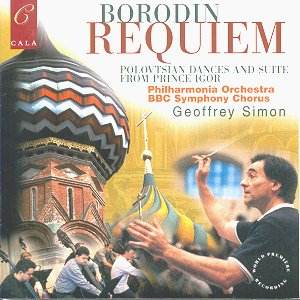Alexander BORODIN (1833-1887)
Requiem (1877, arr. Stokowski)
Polovtsian Dances and Suite from Prince Igor
Nocturne from String Quartet No.2 (arr. Rimsky-Korsakov)
In the Steppes of Central Asia
Petite Suite (orch. Glazunov)
 Margaret Field (soprano)
Margaret Field (soprano)
Ian Boughton (tenor)
Stephanie Chaser (violin)
BBC Symphony Chorus
Philharmonia Orchestra/Geoffrey Simon
Recorded London, 1992
 CALA CACD 1029
[78:11]
CALA CACD 1029
[78:11]
Crotchet
AmazonUK
AmazonUS

The front cover of this beautifully produced release is a bit misleading,
for Borodin's Requiem is quite a short piece and has very little to
do with any attempt at a full-scale Requiem. In fact it originated in a short
Polka in which Borodin incorporated the nursery rhyme Tati-Tati (also
known as Chopsticks). Other members of the "Mighty Handful" also wrote
short pieces using this children's song, so that Borodin later completed
two other pieces also incorporating Tati-Tati, Requiem and
March. Borodin apparently mentioned the words "Requiem aeternam dona eis,
Domine, et lux perpetua luceat eis" seemingly meant for tenor and male voice
chorus. Why he did so, we are not told. Stokowski made an arrangement of
it including tenor and male voices. As might be expected, Stokowski's arrangement
is quite effective though, as usual, he tended to make it sound larger than
life. A curiosity, though well worth the occasional hearing.
The Polovtsian Dances and Suite from "Prince Igor", orchestrations
by Glazunov and Rimsky-Korsakov, are much better known. This includes the
Overture, Chorus of the Polovtsian Maidens (with soprano Margaret
Field), Dance of the Polovtsian Maidens, Polovtsian March
(complete with male voices and off-stage brass band) and the ubiquitous
Polovtsian Dances (with chorus).
Malcolm Sargent's arrangement for strings of the third movement of Borodin's
Second String Quartet is generally well-known and has become quite popular
as Nocturne. However, what we have here, is a very effective arrangement
for violin and small orchestra made by Rimsky-Korsakov in about 1887.
In the Steppes of Central Asia does not need any further pleading,
for this colourful work is one of Borodin's best-known and best-loved pieces.
The Petite Suite in Glazunov's orchestration is also fairly well known
though it is still rather rarely heard in concert, which is a pity for this
is a delightful set of miniatures orchestrated by a master of the orchestra.
So, all in all, a very pleasurable release with some rarities, all well performed
and brilliantly recorded. No reservation whatsoever if this particular coupling
appeals to you.
Hubert Culot

